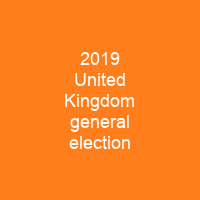The 2019 United Kingdom general election was held on Thursday, 12 December 2019. The election resulted in the Conservative Party receiving a landslide majority of 80 seats. The Conservatives made a net gain of 48 seats and won 43. 6% of the popular vote – the highest percentage by any party since 1979. Many Conservative gains were made in long-held Labour Leave-voting seats dubbed the’red wall’
About 2019 United Kingdom general election in brief
 The 2019 United Kingdom general election was held on Thursday, 12 December 2019. The election resulted in the Conservative Party receiving a landslide majority of 80 seats. The Conservatives made a net gain of 48 seats and won 43. 6% of the popular vote – the highest percentage by any party since 1979. Many Conservative gains were made in long-held Labour Leave-voting seats dubbed the’red wall’ The Labour Party won 202 seats, its lowest number and proportion of seats since 1935. The Scottish National Party made a gain of 13 seats, resulting in 48 out of 59 seats won in Scotland. In Northern Ireland, nationalist MPs outnumbered unionist ones for the first time in history, although the Unionist popular vote remained higher. Boris Johnson won the 2019 Conservative Party leadership election and became Prime Minister on 23 July 2019. May resigned after her party’s poor performance in the 2019 European Parliament election, during the first extension granted by the European Union for negotiations on the withdrawal agreement. Johnson made three attempts to hold a snap election under the process defined in the Fixed-term Parliaments Act 2011, which requires a two-thirds supermajority in order for an election to take place. The House of Commons supported the Early Parliamentary General Election Act 2019 by 438–20, setting the election date for 12 December. On the day of the election, polling stations across the country were open at 7 am, and closed at 10 pm. The deadline for nominations was 14 November 2019, with political parties choosing their candidates for the general election on 15 November.
The 2019 United Kingdom general election was held on Thursday, 12 December 2019. The election resulted in the Conservative Party receiving a landslide majority of 80 seats. The Conservatives made a net gain of 48 seats and won 43. 6% of the popular vote – the highest percentage by any party since 1979. Many Conservative gains were made in long-held Labour Leave-voting seats dubbed the’red wall’ The Labour Party won 202 seats, its lowest number and proportion of seats since 1935. The Scottish National Party made a gain of 13 seats, resulting in 48 out of 59 seats won in Scotland. In Northern Ireland, nationalist MPs outnumbered unionist ones for the first time in history, although the Unionist popular vote remained higher. Boris Johnson won the 2019 Conservative Party leadership election and became Prime Minister on 23 July 2019. May resigned after her party’s poor performance in the 2019 European Parliament election, during the first extension granted by the European Union for negotiations on the withdrawal agreement. Johnson made three attempts to hold a snap election under the process defined in the Fixed-term Parliaments Act 2011, which requires a two-thirds supermajority in order for an election to take place. The House of Commons supported the Early Parliamentary General Election Act 2019 by 438–20, setting the election date for 12 December. On the day of the election, polling stations across the country were open at 7 am, and closed at 10 pm. The deadline for nominations was 14 November 2019, with political parties choosing their candidates for the general election on 15 November.
The general election date was chosen for the election to be held on 9 December 2019, but an attempt to pass an amendment to it by opposition parties failed by 315 votes to 20. The result allowed Johnson a mandate to ensure the UK’s departure from the European EU on 31 January 2020. May lost her majority but was able to resume office as a result of a confidence and supply agreement with Northern Ireland’s Democratic Unionist Party. In July 2019, after May’s resignation, Boris Johnson was elected as Conservative leader and appointed as Prime Minister. Johnson could not induce Parliament to approve a revised withdrawal agreement by the end of October, and chose to call for asnap election. All three attempts failed to gain support: Parliament insisted that Johnson take a no-deal Brexit off the table first and secure a negotiated Withdrawal Agreement, expressed in particular by its enactment against his will of the EU Act 2019. After failing to pass a revised deal before the first Extension’s deadline of 31 October 2019, Johnson agreed to a second extension. Parliament agreed to an extension through the Liberal Democrats on 28 October, with Royal Assent for the EPGEA Act 2019 made the day after the ratification for the ratification of the Act on 30 October. The DUP won a plurality of seats in Northern Ireland. There, the SDLP and Alliance regained parliamentary representation as the DUP lost seats. For the SNP leader, Nicola Sturgeon, her party’s relative success led to renewed calls for a second independence referendum.
You want to know more about 2019 United Kingdom general election?
This page is based on the article 2019 United Kingdom general election published in Wikipedia (as of Dec. 06, 2020) and was automatically summarized using artificial intelligence.







